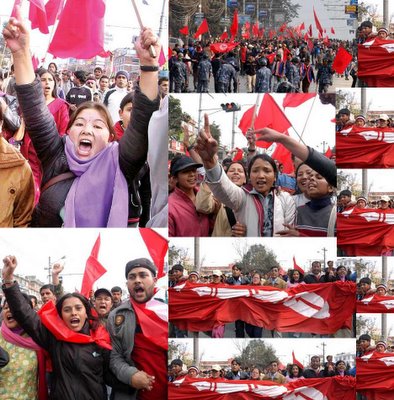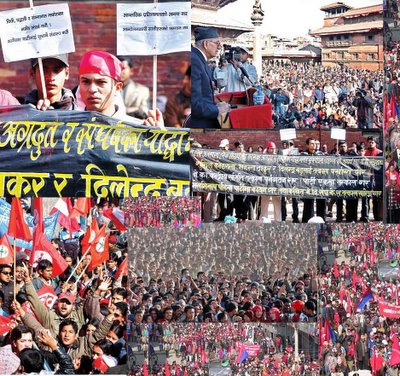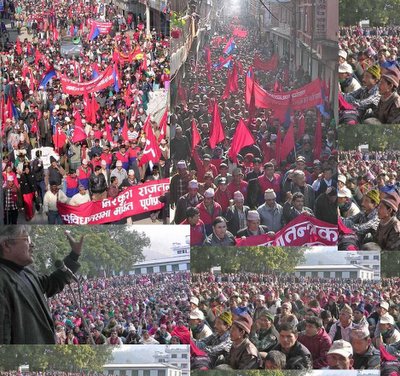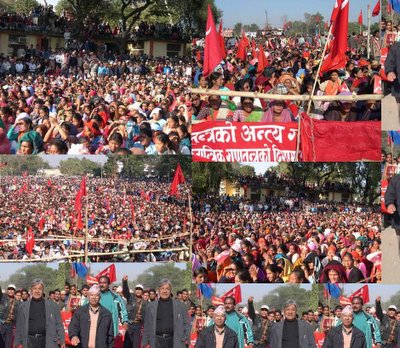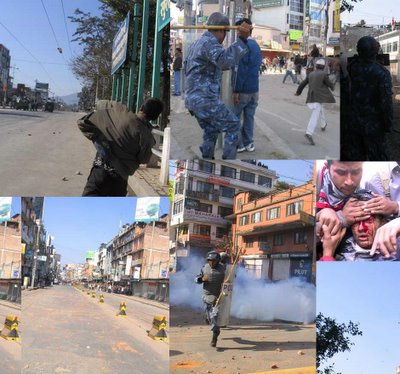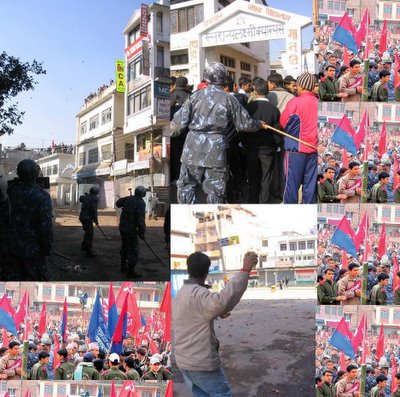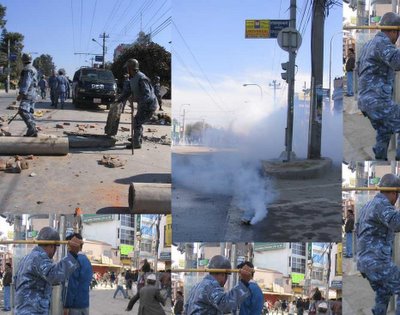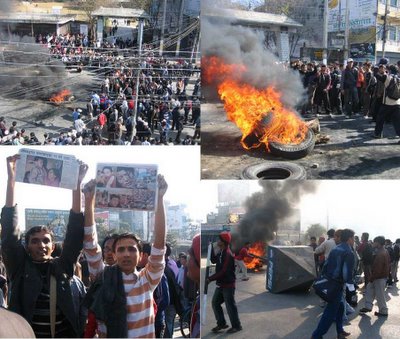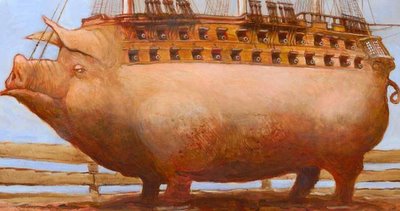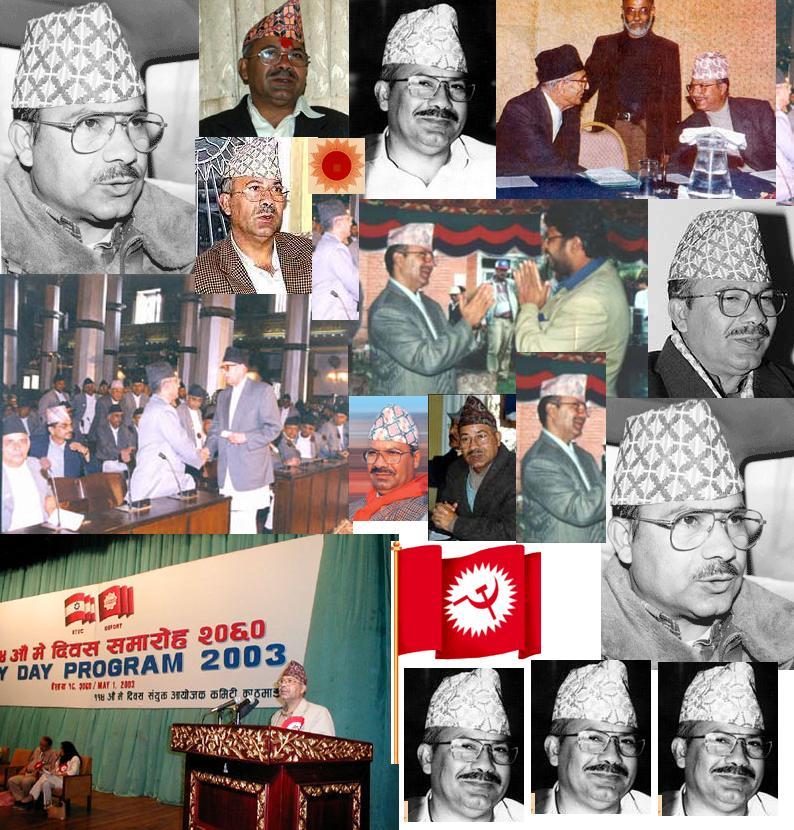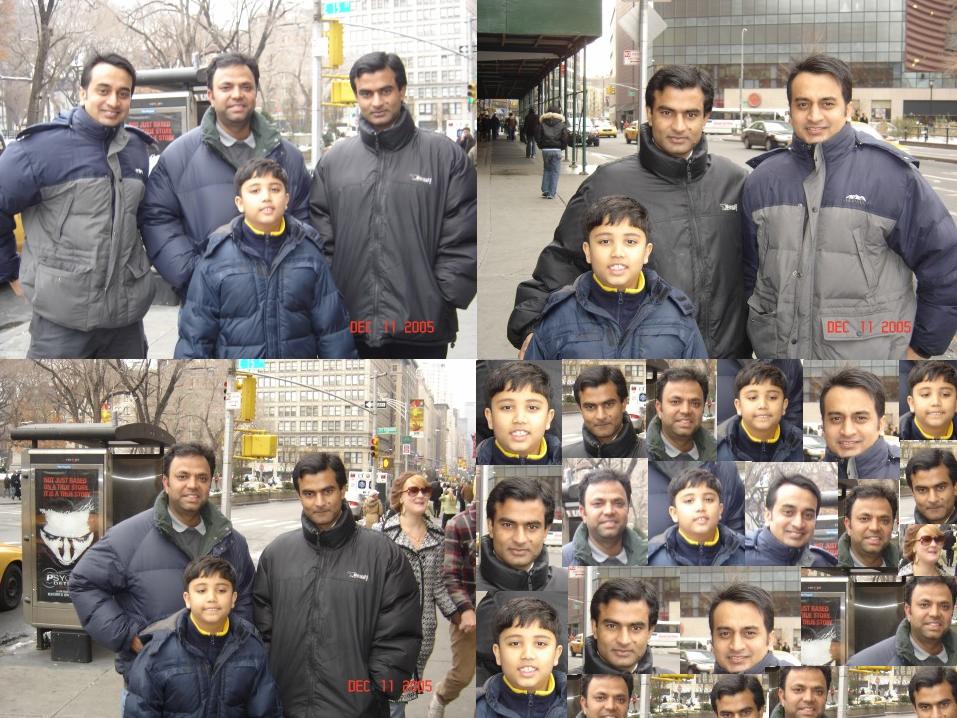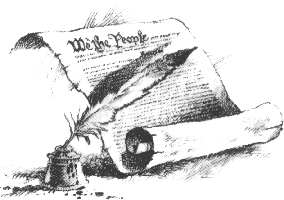चुनाव बहिष्कार बाहेक विकल्प छैन: सात दल
देशको शोषण दमन गरेर विदेशी बैंकमा अथाह सम्पत्ति थुपार्नेहरूलाई देशको कुनै माया हुँदैन । तर यो देशको हितमा जसको हित अन्तरनिहित हुन्छ, उसको भविष्य यही देशसँग गाँसिएको हुन्छ । त्यसैले राजाले आफ्नो सारा असंवैधानिक, अप्रजातान्त्रिक, तानाशाही कामकारबाहीलाई समर्थन गराउन घोषणा गरिएको यो निर्वाचनलाई सक्रियतापूर्वक बहिष्कार गरी आफ्नो देशप्रतिको निष्ठा र कर्तव्यलाई पूरा गर्नु सबै देशभक्त र प्रजातन्त्रवादीहरूको पुनित कर्तव्य भएको छ ।
आदरणीय दिदीबहिनी तथा दाजुभाइहरू
आज हाम्रो देश गम्भीर संकटको अवस्थामा छ । यो अवस्था राजाको सर्वसत्तावादी निरंकुश शासक बन्ने अति महत्त्वाकांक्षा र उनका जनविरोधी क्रियाकलापबाट उत्पन्न भएको हो । जनताको चाहनाको उचित सम्मान गर्न र देशमा शान्ति कायम होस् भन्ने राजा चाहँदैनन्, उनी एक नेपालीबाट अर्को नेपालीको हत्या भइरहोस् र नेपाली नेपालीबीचको भिडन्तले सृजित अशान्तिको आडमा निरंकुश शासन लम्ब्याइरहुँ भन्ने मात्र चाहन्छन् । राजा ०४६ सालको जनआन्दोलनबाट प्राप्त उपलब्धिलाई समाप्त गर्दै मुलुकमा आफ्नो हुकुमी र स्वेच्छाचारी शासन लाद्न चाहन्छन् । राजाको आजसम्मको सबै क्रियाकलापले यिनै कुरालाई प्रस्ट गरेको छ । होइन भने माओवादीले युद्धविराम गरेर आन्दोलनरत सात राजनीतिक दलहरूसँग समझदारी गर्दै पूर्ण लोकतन्त्र र शान्तितिर र्फकने चाहना राख्दा त्यसलाई हरतरहले बिथोल्ने प्रयास गर्ने थिएनन् । लामो समयदेखि सशस्त्र संघर्षमा संलग्न माओवादीलाई शान्ति र मेलमिलापतिर प्रवृत्त गराउन लागेका राजनीतिक दलहरूलाई अनेक अनर्गल र अवाञ्छित लान्छना लगाउने आतंककारीको मतियार भनाउने जस्ता निकृष्ट एवं देशघाती कार्य गराउने थिएनन् ।
राजाले प्रतिगामी कदम सुरु गरेपछि मुलुक दिन प्रतिदिन अकल्पनीय अशान्ति र अराजकतातिर धकेलिएको छ । नेपालका सम्पूर्ण मित्रराष्ट्रहरू तथा संयुक्त राष्ट्रसंघजस्ता निकायहरूले राजाको कामकारबाहीप्रति असन्तुष्टि व्यक्त गरिरहेका छन् । राजा राष्ट्रिय र अन्तर्राष्ट्रियरूपमा एक्लिएका छन् । तर राजाले यी सबैप्रति कुनै सरोकार देखाएका छैनन् । देशको हित र प्रतिष्ठाको निम्ति यो एक अत्यन्तै चिन्ताको विषय हो । यस्तै स्थिति कायम रहिरहे हाम्रो देश विश्व समुदायबाट एक्लिएर घोर अन्धकारतिर धकेलिने खतरा प्रत्येक दिन बढिरहेको छ ।
देशको पर्यटन व्यवसाय र उद्योग धन्दाहरू पूर्णतया बन्द हुँदैछन् । कृषि र अरू रोजगारीका अवसरहरू समाप्त भएका छन् । गाउँ-गाउँबाट युवाहरू पलायन भएर विदेशमा अति दयनीय जीवनयापन गर्न बाध्य भइरहेका छन् । कतिपय पहाडी जिल्लाका जनताले खाद्यान्नको अभावमा भोकभोकै रहनुपरेको छ । भ्रष्टाचार, कुशासन र मानवअधिकार उल्लंघनका अनेकौं घटनाले मुलुक क्षतविक्षत र आक्रान्त भइरहेको छ । यति ठूलो र भयावह संकट यसभन्दा पहिले, यसरी कहिले पनि मुलुकले बेहोर्नुपरेको थिएन । तर एकछत्र शासक भएका राजालाई देशको यो दुर्गतिप्रति अलिकति पनि चिन्ता छैन । उनी गरिब देशको राजस्व खर्च गरेर अनावश्यकरूपमा अत्यन्त महँगो एवं विलाशी भ्रमण गरिरहेका छन् र देशलाई सैनिकीकरणतर्फ धकेलिरहेका छन् । समग्रमा राजा देशमा शान्ति, लोकतन्त्र र समृद्धिको बाटोमा अवरोध भएका छन् ।
राजाका प्रत्येक चरित्र र कामकारबाहीले राजा महेन्द्रको सर्वसत्तावादी नीतिलाई अनुशरण गरिरहेको छ । नेपालमा पनि जनप्रतिनिधिको शासन छ भन्ने अन्तर्राष्ट्रिय जगतलाई देखाउन राजा महेन्द्रले पञ्चायती निर्वाचनको नाममा कुनै जनाधार नभएकाहरूलाई जिताएर ल्याउने नाटक गरेका थिए । अहिले यी राजाले पनि त्यही निर्दलीय निरंकुशकालका जनविरोधी एवं देशघाती तत्त्वलाई आफ्नो सहयोगी बनाएर अन्तर्राष्ट्रिय जगत्लाई देखाउनमात्र निर्वाचनको नाटक मञ्चन गर्न, गराउन लागेका छन् । तर यस्ता कृत्रिम कुराले कुनै पनि मित्रराष्ट्र तथा अन्तर्राष्ट्रिय समुदायलाई भ्रममा पार्न सक्दैन । तीनपटक संसदीय निर्वाचनमा र दुईपटक स्थानीय निर्वाचनमा स्वतन्त्रतापूर्वक आफ्नो मताधिकार प्रयोग गरिसकेका जनताले यो नाटकीय निर्वाचनमा आफ्नै हक र हितविरुद्धको पात्र भएर आफ्नो देश, आफू तथा आफ्ना सन्ततीका भलाइलाई आफैं कुठाराघात गर्न सक्दैनन् ।
आज निर्विघ्नरूपमा जनताले आफ्नो प्रतिनिधि छान्न नसक्ने अवस्थामा राजा किन नगरपालिकाको निर्वाचन गराउन उद्यत छन् ? यसलाई प्रत्येक चेतनशील नेपालीले गम्भीर भएर सोच्नुपर्छ । राजा निर्वाचन भनेको सेना र प्रहरीको घेराभित्र हुने नाटक हो भन्ने मान्यतामा आधारित भई स्वतन्त्र निर्वाचन प्रणालीलाई नै समाप्त पार्न चाहन्छन् । निरंकुश शासक बन्ने चाहनामा नेपाली जनतासँग निहुँ खोजेर नगरकोट र अरू कतिपय ठाउँको जस्तै निहत्था जनतालाई गोलीको निशाना बनाउन चाहन्छन् ।
आज नियम, कानुन, संविधान आदि सबैलाई लत्याएर राजा एकतन्त्रीय हुकुमी शासन सञ्चालन गरिरहेका छन् । यही निर्वाचनको नाटकबाट ल्याइने तथाकथित जनप्रतिनिधिबाट उनी निरंकुश राजतन्त्रलाई वैधानिकता दिलाउन खोजिरहेका छन् । निरंकुश राजतन्त्रअन्तर्गत हुने कथित निर्वाचनले मुलुकको समस्या समाधान गर्दैन, बरु यसले मुलुकलाई अझ बढी अशान्ति र अस्थिरतातर्फ धकेल्ने र स्थितिलाई थप जटिल बनाउँदै देशलाई अरू गम्भीर संकटग्रस्त अवस्थामा पुर्याउने प्रस्ट छ । यसरी राजा र उनका सहयोगीहरूले यो निर्वाचनलाई देशको हित र जनताको अधिकारलाई निर्ममतापूर्वक तहसनहस पार्ने हतियारका रूपमा प्रयोग गर्न लागेका बेला यो देशको इतिहास र भविष्यले हामी सबैलाई आफ्नो कर्तव्यप्रति सचेत रहन घचघच्याइरहेको छ ।
निरंकुश राजतन्त्रलाई मजबुत बनाउन र जनतालाई कमजोर पार्न प्रयोग गरिने राजाको यो निर्वाचन हतियारलाई यसरी आफ्नै घाँटीमा हामीले प्रहार हुन दिने कि नदिने ? मुलुकलाई समग्ररूपमा छिन्नभिन्न पारेर गृहयृद्धमा होम्न लागेको यो षड्यन्त्रलाई हामीले हेरिमात्र रहने कि कडा प्रतिकार गर्ने ? तसर्थ देश, जनता र प्रजातन्त्रका विरुद्ध नियोजित षड्यन्त्रका रूपमा घोषणा गरिएको कथित निर्वाचनलाई सक्रियतापूर्वक बहिष्कार गर्दै असफल बनाउनुबाहेक अर्को विकल्प छैन । यसक्रममा सात दलसँग सम्बन्धित कुनै पनि सदस्य कथित निर्वाचनमा उम्मेदवार बन्ने, प्रस्तावक-समर्थक- प्रचारक हुनेलगायत निर्वाचनको प्रक्रियामा सहभागी भएमा निजलाई कम्तीमा ५ वर्षका लागि सम्बन्धित पार्टीबाट निष्काशन गरिनेछ । साथै आमनेपाली जनता र विश्व समुदायबाट बहिष्कृत बन्दै गइरहेको निरंकुश राजतन्त्रको रक्षा कवज बन्ने र लोकतन्त्रविरोधी कित्तामा खडा भएर जनताको घृणाको पात्र बन्ने यो कथित निर्वाचनमा भाग नलिन सबै नेपाली दिदीबहिनी तथा दाजुभाइमा हामी हार्दिक आह्वान गर्छौं ।
देशको शोषण दमन गरेर विदेशी बैंकमा अथाह सम्पत्ति थुपार्नेहरूलाई देशको कुनै माया हुँदैन । तर यो देशको हितमा जसको हित अन्तरनिहित हुन्छ, उसको भविष्य यही देशसँग गाँसिएको हुन्छ । त्यसैले राजाले आफ्नो सारा असंवैधानिक, अप्रजातान्त्रिक, तानाशाही कामकारबाहीलाई समर्थन गराउन घोषणा गरिएको यो निर्वाचनलाई सक्रियतापूर्वक बहिष्कार गरी आफ्नो देशप्रतिको निष्ठा र कर्तव्यलाई पूरा गर्नु सबै देशभक्त र प्रजातन्त्रवादीहरूको पुनित कर्तव्य भएको छ ।
हामी निरंकुश राजतन्त्रको अन्त्य गरेर पूर्ण लोकतन्त्र स्थापना गर्ने आन्दोलनमा समाहित छौं । यसका लागि आन्दोलनको शक्तिले संसद् पुनःस्थापना गर्ने र त्यसको निर्णयले सर्वदलीय सरकार बनाउने, माओवादीसँग वार्ता गर्ने र सहमतिको आधारमा संविधानसभाको निर्वाचन गरी सार्वभौमसत्ता र राजकीय सत्ता पूर्णरूपले जनतामा स्थापित गराउने शान्तिपूर्ण जनआन्दोलनमा पूर्णप्रतिबद्ध छौं । सशस्त्र द्वन्द्वको अग्रगामी राजनीतिक निकासद्वारा समाधान गरेर देशमा शान्ति बहाली गर्न हामी पूर्णकटिबद्ध छौं । तसर्थ निरंकुश राजतन्त्रको अन्त्य गर्न, संविधानको गलत व्याख्या र प्रयोग गर्दै राजाले चलाएको प्रतिगामी षड्यन्त्रलाई परास्त गर्न, संयुक्त जनआन्दोलनबाट पूर्ण लोकतन्त्र र शान्तिबहाली गर्न, राज्यको पुनर्संचना गरी समावेशी र सहभागीमूलक पूर्णप्रजातन्त्रको स्थापना गर्न, सात दल र माओवादीबीच भएको १२ बुँदे समझदारीलाई अझ ठोस र प्रस्ट बनाउँदै कार्यान्वयन गर्न कथित नगरपालिकाको निर्वाचनलाई शान्तिपूर्ण तरिकाबाट सशक्त र प्रभावकारी ढंगले सक्रिय बहिष्कार गर्दै जनआन्दोलनलाई नयाँ उचाइमा लैजान सम्पूर्ण देशवासी दिदी-बहिनी, दाजुभाइहरूमा हार्दिक अनुरोध गर्दछौं ।
१. नेपाली कांग्रेस- सभापति, गिरिजाप्रसाद कोइराला
२. नेकपा (एमाले)- महासचिव, माधवकुमार नेपाल
३. नेपाली कांग्रेस (प्रजातान्त्रिक)- का.वा. सभापति, गोपालमान श्रेष्ठ
४. जनमोर्चा, नेपाल- अध्यक्ष अमिक शेरचन
५. नेपाल मजदुर किसान पार्टी- अध्यक्ष, नारायणमान विजुक्छे
६. नेपाल सद्भावना पार्टी (आनन्दीदेवी)- राष्ट्रिय उपाध्यक्ष, भरत विमल यादव
७. संयुक्त वाममोर्चा नेपाल- अध्यक्ष, कृष्णदास श्रेष्ठ
मिति: ०६२ पुस १४ गते


